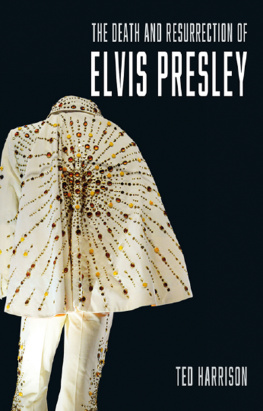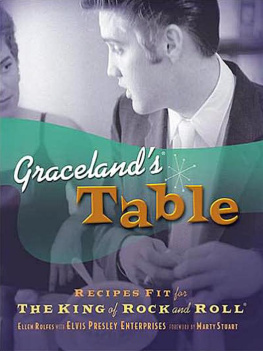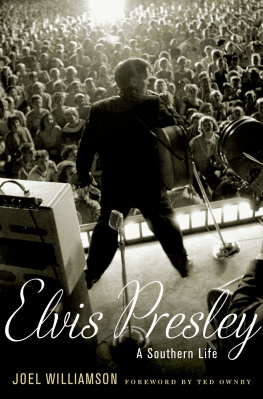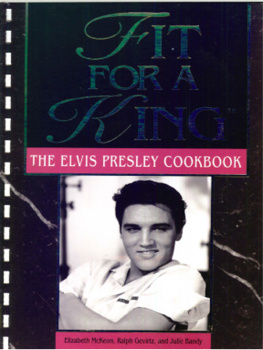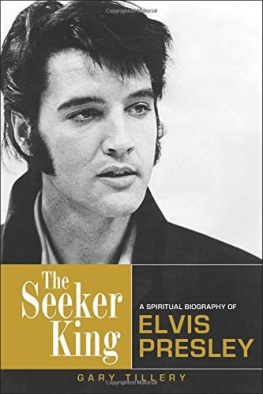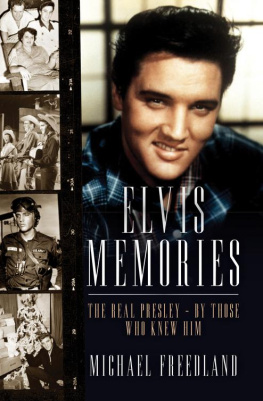THE DEATH AND
RESURRECTION OF
ELVIS PRESLEY

THE DEATH AND
RESURRECTION OF
ELVIS PRESLEY
Ted Harrison

REAKTION BOOKS
Published by Reaktion Books Ltd
Unit 32, Waterside
4448 Wharf Road
London N1 7UX, UK
www.reaktionbooks.co.uk
First published 2016
Copyright Ted Harrison 2016
All rights reserved
No part of this publication may be reproduced, stored in a retrieval system, or transmitted, in any form or by any means, electronic, mechanical, photocopying, recording or otherwise, without the prior permission of the publishers
Page references in the Photo Acknowledgements and
Index match the printed edition of this book.
Printed and bound in Great Britain by
TJ International, Padstow, Cornwall
A catalogue record for this book is available from the British Library
eISBN: 9781780236834
Contents

Collectors items: original 1980s Elvisly Yours magazine, one of the most successful of the many print and online magazines about Elvis Presley.
Introduction

E lvis Presley is not dead.
Although his mortal remains rest in the Meditation Garden at Graceland, the King of Rock n Roll lives on in the hearts and minds of many thousands of his fans around the world. He is much more than a cherished memory; he remains a living presence. To some devotees he is a constant companion. He is a physically absent but ever-present friend. His music plays constantly in their ears. His image is all around them. In the homes of true fans there are pictures of the King in every room: posters, souvenirs of Graceland, prints of Elvis on duvets and pillows, even looking up from plates at mealtimes. There are truly dedicated fans who have his picture permanently tattooed on their bodies.
Elvis fans are united by their love for and devotion to their hero, yet there is no such person as a typical Elvis fan. They defy categorization by gender, age or class. It cannot be said that Elvis today is only idolized by a generation of grandmothers who developed an adolescent crush on the American singer back in the 1950s and whose lives have never moved on. Every year new fans discover him. There are young people whose parents were not born when the physical Elvis was laid to rest at Graceland but who have found the King and developed an overwhelming passion for him. They have discovered his music as it has been reissued and remixed, perhaps to be used on the soundtracks of films or to promote products or enhance commercial brands. Elvis no longer has to be bought from record shops or listened to on forbidden radio shows. He can be downloaded at any time. Elvis is now available 24 hours a day. There are even online radio stations entirely devoted to his music.
This book tells the story of Elvis, but not in the traditional way that starts with his birth in a Tupelo shack and ends with his ignominious death in his bathroom at his Graceland mansion. It harks back, where relevant, to his life story, but in reality it is about his life after death. The book looks at why Elvis has, as it were, risen from the grave to take on a new life as an heroic myth. It looks ahead to the future and suggests, to adapt the famous words of President Ronald Reagan, We aint seen nothing yet. New, young fans are especially fortunate: they can look forward in their lifetime to many astonishing things to come, things that people of Elviss day would have considered miraculous. Already his recordings are being digitally reworked to create amazing new sounds. The potential for his music to be presented in creative, innovative ways is almost limitless. More and more new interpretations of his music will come along, creating a Presley sound that not even Elvis himself could have imagined. Shows are being produced that create much of the magic of an original Elvis concert by blending old film and live music. But that is only the start. Thanks to modern technology and capitalist enterprise, it will not be long before Elvis walks again. It will indeed be as if he has been raised from the dead. Fans will be able to attend concerts and see and hear their idol as if he is truly there in the flesh.
The Presley family no longer owns Elvis. In 2013, the legal rights to license his likeness and image, along with the income from Graceland, were put up for sale by the media rights management consortium that was then the owner, and found a buyer. While he is in one sense public property, the legal rights to exploit his image and likeness, in other words the marketable brand, has been sold. Even the management of Graceland has been forfeited in exchange for dollars. Few fans know the names Authentic Brands Group, Leonard Green and Partners, Joel Weinshanker and the National Entertainment Collectibles Association, but they are the people who profit or have profited when the fans spend their money in the name of Elvis. Elvis today rises phoenix-like from the flames of the old family business, fanned and fuelled by international capitalism.
This is a book about a myth: the powerful myth that is Elvis Presley and its enduring reach and influence. It is also a book about how the myth is fast becoming a new reality as previous restrictions on the exploitation of the singers legacy are lifted and investors see there are huge sums of money to be made from it. The Elvis myth lives on with renewed vigour. But what is a myth? It is not an untruth. It might be a tradition or a legend from long ago, or it could be a story of recent origin. It might be based on fact; a myth can also have the quality of fiction. Frequently fact and fiction are interwoven into a fable, or a set of stories, that is both larger than life and greater than literal truth. It is frequently the case that myths are told about heroes and heroic events.
And so it is with Elvis.
Of course Elvis was a real man, as his recordings, films, biographies, surviving friends and family all attest. He was born in Tupelo, Mississippi, on 8 January 1935. He had a meteoric rise to fame, became a recording superstar and was hailed as the King of Rock n Roll yet died prematurely on 16 August 1977. At the end he was alone, obese and addicted to prescription drugs. It looked as if his dazzling career had nowhere to go but down.
Yet his death triggered an extraordinary wave of grief and started a new Elvis movement that has continued to grow and expand. Since Elviss death, not only has he continued to sell records, but he has possibly gained more fans than he ever had in his lifetime as a new wave of children and young adults discover him. Many of the greatest stars of rock and pop, both his contemporaries and those who followed him, have made a point of paying homage to Elvis as their first and greatest influence. Before Elvis there was nothing, said John Lennon.
The face and name of Elvis Presley are among the most widely recognized icons of modern times. Of all modern brands perhaps only Coca-Cola is better known. Hundreds of millions of people around the world, with no special interest in his life or music, recognize Elvis. His is one of the few names that need no surname. Say Elvis in Beijing, Patagonia, Soweto or Vladivostok, and there will be nods of recognition across the language barrier. Elvis is a touchstone, says one lifelong American fan. People are charmed when they know that Im an Elvis fan and immediately start talking about their own experiences.

